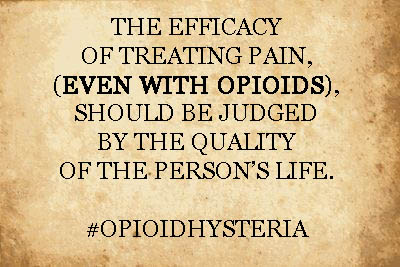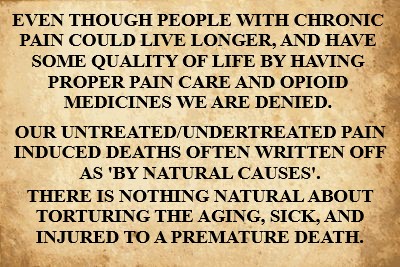We've lost too many in this insane '#opioid' war.
The sick & injured are spending the last years of their lives fighting, suffering, begging MDs & GOV for the medicines they need to mediate their pain.
They say taking our medicines away is to 'save' people.
No one is being saved.
The sick & injured are spending the last years of their lives fighting, suffering, begging MDs & GOV for the medicines they need to mediate their pain.
They say taking our medicines away is to 'save' people.
No one is being saved.
Death due to #Untreatedpain or #Undertreatedpain is death by a thousand cuts.
#RxOpioidsSaveLives
#PainKills
#RxOpioidsSaveLives
#PainKills

Gov entities & groups like @ShatterproofHQ & @supportprop are directly responsible for spreading the #GreatOpioidLie.
No one with addiction is being helped by denying people in pain #opioid pain medicines.
In fact, despite draconian opioid policies, ODs continue to skyrocket.
No one with addiction is being helped by denying people in pain #opioid pain medicines.
In fact, despite draconian opioid policies, ODs continue to skyrocket.

Right now #Opioid policies aren't resulting in anything resembling #PatientCenteredCare.
Even though quality of life has declined for millions, allowing people pain care with proven, effective, opiate class medicines has become taboo in medical practice.
#MedicalTyranny
Even though quality of life has declined for millions, allowing people pain care with proven, effective, opiate class medicines has become taboo in medical practice.
#MedicalTyranny

We're told to 'quiet down', to supress any anger we might feel, told we just need to be patient year after year, while one after another we watch more and more of our friends in the pain community senselessly losing their lives.
#RxOpioidsSaveLives #HarmReduction #OpioidHysteria
#RxOpioidsSaveLives #HarmReduction #OpioidHysteria

Shamed by the public, by our GOV officials, by medical 'professionals', ignored by most in the media.
Admonished that MDs are withholding needed medicines from us 'for our own good'.
Gaslit, abused both emotinally & physically, there is nowhere for us to turn.
#ScreamLouder
Admonished that MDs are withholding needed medicines from us 'for our own good'.
Gaslit, abused both emotinally & physically, there is nowhere for us to turn.
#ScreamLouder

Constant pain wreaks havoc on the body, mind, and soul.
Anyone in an instant can go from healthy and functional to losing their autonomy in regard to both basic self care and being able to make decisions about what is right for them as far as medical treatment.
#MedicalTyranny
Anyone in an instant can go from healthy and functional to losing their autonomy in regard to both basic self care and being able to make decisions about what is right for them as far as medical treatment.
#MedicalTyranny

There's so much more I could add to this thread.
But why bother, I'll likely just find myself screaming into the void-Locked in an echo chamber- Made a shut in after 10 long yrs of torture-No longer able to march, or travel, or to be an effective catalyst of change.
#ChronicPain
But why bother, I'll likely just find myself screaming into the void-Locked in an echo chamber- Made a shut in after 10 long yrs of torture-No longer able to march, or travel, or to be an effective catalyst of change.
#ChronicPain

• • •
Missing some Tweet in this thread? You can try to
force a refresh








